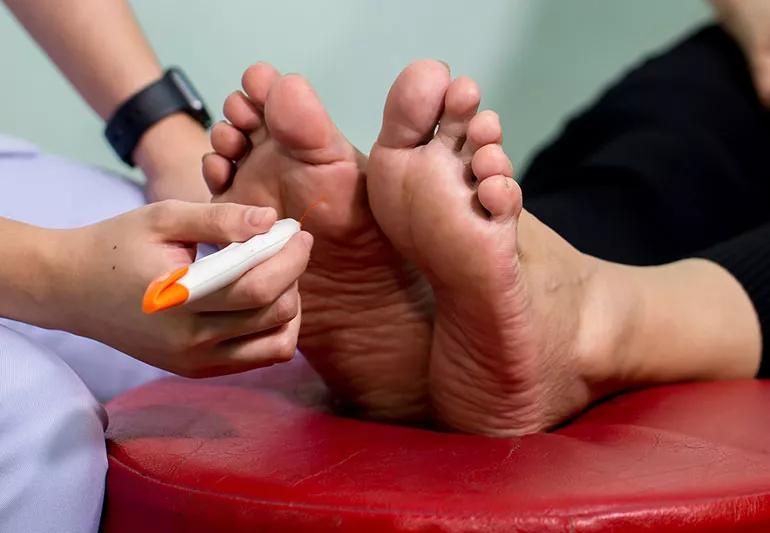How to avoid tingling, burning or stabbing in your feet

Image content: This image is available to view online.
View image online (https://assets.clevelandclinic.org/transform/d961cec8-93bf-4a36-bc43-61b0c2e34daa/neuropathyFeet-1129812319-770x533-1_jpg)
neuropathy check-up on feet
If you have diabetes, you know it well: Too much sugar isn’t good for you. People whose blood sugar is too high or difficult to control are more susceptible to cardiovascular disease, kidney damage, eye problems and other complications, including nerve damage (diabetic neuropathy).
Advertisement
Cleveland Clinic is a non-profit academic medical center. Advertising on our site helps support our mission. We do not endorse non-Cleveland Clinic products or services. Policy
“High blood sugar is toxic to your nerves,” says pain management specialist Robert Bolash, MD. “When a nerve is damaged and misfiring, you may feel tingling, pins and needles, burning or sharp, stabbing pain.”
Diabetic neuropathy typically starts in your toes, feet or ankles and creeps up your body as the condition worsens, he says. However, nerve damage also can affect your hands and wrists as well as your heart, digestive system, sex organs and more.
About one-third to one-half of people with diabetes have some kind of nerve damage, reports the National Institute of Diabetes and Digestive and Kidney Diseases (NIDDK).
“Anyone with diabetes can get nerve damage at any time,” explains Dr. Bolash. “There is an association with very high levels of blood sugar and the development of diabetic neuropathy, but the two do not always go hand in hand.”
Unfortunately, even patients with very mild cases of diabetes may be affected with severe cases of nerve pain, he says, while others can be spared. According to the NIDDK, the highest rates of nerve damage are among people who have had diabetes 25 years or longer.
To avoid diabetic neuropathy, Dr. Bolash advises: Control your blood sugar — and keep it as close to nondiabetic levels as possible.
Advertisement
The bad news about diabetic neuropathy is that it’s tough to reverse. It also can cause serious problems, especially in your feet.
If you don’t feel blisters, sores or other foot injuries and don’t promptly care for them, you can develop wide-spread, difficult-to-treat infections that, in severe cases, may require amputation.
The good news is that while you can’t always cure diabetic nerve damage, you often can relieve its symptoms.
“We work with endocrinology specialists to help patients control blood sugar levels. That’s critical to helping prevent or delay additional nerve damage,” says Dr. Bolash. “Then, to manage any discomfort, we explore a range of treatments.”
If you’re already suffering from neuropathy, Dr. Bolash says some of the best ways to find relief include:
“Stimulation doesn’t fix the damage from diabetes,” says Dr. Bolash. “It tricks the brain’s ability to sense pain.”
If you have diabetes, discuss any nerve pain with your primary care physician and be sure to be screened for diabetic complications.
Physicians can actually diagnose neuropathy before you feel it ― and early intervention can make a substantial difference. The sooner nerve damage is detected, the easier it can be treated.
Advertisement

Sign up for our Health Essentials emails for expert guidance on nutrition, fitness, sleep, skin care and more.
Learn more about our editorial process.
Advertisement
Hot, humid weather can affect your blood sugar levels and even cause dehydration or heat stroke
The good news? Prediabetes can be erased with healthy lifestyle changes, including eating more nutritious foods
Fresh or frozen fruits that are low on the glycemic index should be your go-to, as they’re full of fiber and other nutrients
Adding nuts like pistachios, almonds or pecans to your diet can help manage blood sugar levels
A diabetes diagnosis, new or long-standing, can trigger reactions like grief, stress, depression and frustration, but symptom relief and help are available
The short answer: Yes, but you need to eat it in moderation and keep track of how much you consume
Sweet potatoes are great, but sweetened drinks aren’t so great
Some sweeteners may have health risks, so it’s best to keep your intake moderate
Although it could be used as a moisturizer, this new trend is not recommended
Communicating clear limits helps protect your time, energy and emotional well-being
High cholesterol can be genetic, but testing and treatment can lower your heart disease risk